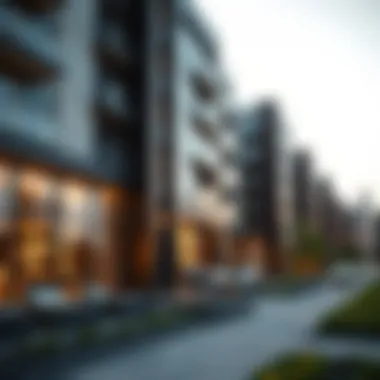Understanding Rent Increases in Dubai's Real Estate Market


Intro
Navigating the tangled web of rent increases in Dubai can resemble trying to read tea leaves. With its booming real estate market and expat-centric living dynamics, understanding the rules and regulations around rental price adjustments is crucial for both tenants and landlords alike. Whether you are looking to invest in investments or trying to secure a rental property, knowing the ins and outs of what's legal and what's not can save you a considerable amount of time, effort, and money.
As Dubai continues to thrive, its rental landscape has become equally complex, shaped by factors like government intervention, market conditions, and tenant rights. With a growing populace, fueled primarily by expatriates coming in from all corners of the globe, the need to grasp these nuances only intensifies. Both investors and expatriates must stay ahead of the curve, anticipating changes that can impact their financial strategies and lifestyle choices. This understanding forms the backbone of our exploration into the realm of rent increases in Dubai's real estate market.
In the upcoming sections, we will delve into the current market insights, strategic property investment techniques, and provide an overview of tenant protections. Investors and tenants will benefit from knowing how these components interplay, ensuring they make informed decisions amidst Dubai's ever-evolving rental landscape.
Market Insights
Current Trends and Statistics
The rental market in Dubai has seen a shifting tide over recent years. The growing demand for housing, driven by a strong influx of expatriates, has led to some areas experiencing substantial price hikes. However, it’s important to note that fluctuations can vary significantly by neighborhood. For example, areas like Dubai Marina and Downtown Dubai have consistently reported higher rental increases, while locations further away from the city center may be more stable or even see declines in rent.
Here are some key statistics worth mentioning:
- Average rental growth: In 2023, the average rent for residential properties increased by approximately 10% compared to last year.
- Office spaces: The demand for commercial real estate has also elevated; its rental prices grew by an average of 8% in key business districts.
While these numbers can be intimidating, they paint a picture of a market bursting with opportunity for the informed investor.
Future Predictions and Opportunities
Looking ahead, many analysts suggest that the demand for rental properties in Dubai is likely to continue to rise. Factors such as the upcoming Expo 2025, the gradual easing of travel restrictions post-pandemic, and the city’s growing reputation as a global business hub are expected to contribute positively to the rental market. However, with opportunities come challenges; prospective investors should be mindful of potential oversupply in certain areas, which may lead to a stabilizing or even reducing of rental prices in the mid to long term.
Identifying burgeoning market opportunities is paramount. Properties in newer developments or up-and-coming neighborhoods may offer lucrative returns. For investors with the knack for spotting trends, tapping into locations before they become the next big thing can yield substantial payoffs.
Investors and analysts should consistently keep an eye on government regulations as they continually shape the rental landscape. Knowing when and how those rules may shift can mean the difference between a profitable investment and an uphill battle.
"In the game of real estate, knowledge isn't just power, it's profit."
Staying abreast of these trends equips both landlords and tenants with the insights needed to deviate from possible pitfalls and seize opportunities as they arise.
Regulatory Framework Governing Rent Increases
Understanding the regulatory framework that governs rent increases in Dubai's real estate market is paramount for both landlords and tenants. Given the ever-changing dynamics of the market and the swift pace of urban development, having a solid grasp of these regulations helps in making informed decisions. This framework not only lays the groundwork for rental agreements but also offers necessary protections for all parties involved. Without such safeguards, chaos could ensue, leading to misunderstandings and potential conflicts over rental prices.
Overview of Dubai's Rental Laws
Dubai's rental laws are designed to balance the interests of tenants and landlords, promoting stability without stifling market growth. The primary legal document governing rental agreements in Dubai is the Dubai Tenancy Law, which outlines clear provisions regarding lease agreements, rent increases, and tenant rights.
Key Provisions Include:
- Tenure and Lease Terms: The law stipulates that rental contracts should be written, detailing lease duration and conditions. This ensures clarity concerning both parties’ responsibilities
- Rent Increase Notifications: Landlords must notify tenants of rent increases at least 90 days prior to the lease end, ideally in writing, to avoid any future disputes.
- Dispute Resolution: Dubai’s rental laws provide mechanisms to resolve disputes efficiently, emphasizing mediation as a preferred first step.
This comprehensive structure not only protects tenants from arbitrary rent hikes but also incentivizes landlords to maintain their properties, thus contributing positively to the market's overall health.
Role of the Dubai Land Department
The Dubai Land Department (DLD) plays a pivotal role in regulating the real estate sector, particularly concerning rental agreements. It acts as a central authority coordinating various aspects of property management, market transparency, and dispute resolution.
Functions of the DLD:
- Rental Index: DLD maintains a rental index which serves as a reference for property values and rental prices across the emirate. This tool allows landlords and tenants to make data-driven decisions.
- Registration of Lease Contracts: The DLD mandates that all rental contracts be registered, which adds a layer of security and legitimacy to the agreements.
- Market Regulation: By monitoring market trends and behaviors, the DLD works to ensure compliance with existing laws, smoothing the path for transparent and fair rent increases.
In essence, the DLD serves as both a regulating body and a facilitator of fair practices in the rental market, ensuring that transactions are conducted with integrity and legality.
Vision of Dubai's Real Estate Strategy
With a keen focus on sustainable development, Dubai's real estate strategy aims to create a balanced approach to growth that benefits all stakeholders. The government’s vision is not only to attract expatriates and investors but also to foster a vibrant community where residents feel secure and valued.
Strategic Goals:
- Fostering Growth: The strategy is centered on promoting an investment-friendly environment, aiming for a steady influx of both local and foreign investments in the property market.
- Sustainability: Emphasis on sustainable practices in developing new properties, aligning with global standards for urban living.
- Community Development: By encouraging mixed-use developments, the strategy seeks to create well-rounded neighborhoods that cater to various demographics and lifestyles.


Overall, Dubai's real estate strategy reflects a forward-thinking approach, considering current needs while planning for future growth.
Rent Increase Caps and Regulations
Understanding the regulations surrounding rent increases in Dubai's real estate market is crucial for both landlords and tenants. These regulations are designed to create a balance, ensuring that property owners can generate a fair return while protecting tenants from unreasonable hikes. Given the dynamic nature of Dubai’s property landscape, being aware of the specific elements governing rent increases helps in making informed decisions.
Understanding the Rent Increase Calculator
One of the essential tools introduced in Dubai's rental framework is the Rent Increase Calculator. This tool simplifies the calculating process for both landlords and tenants, indicating how much rent can legally be increased.
To use it effectively:
- Enter the current rent amount.
- Specify the length of the lease.
- Input the relevant real estate zone.
The calculator then outlines the permissible rent increase based on the latest averages provided by the Dubai Land Department. It’s a hassle-free way for landlords to remain compliant and helps tenants understand their potential financial obligations. Being educated on the use of this calculator not only alleviates confusion but also serves as a robust negotiation point in lease discussions.
Annual Limits on Rent Increases
Each year, the Dubai Land Department sets caps on how much rent can be increased. While the exact percentage can fluctuate based on market conditions, there is an emphasis on adhering to limits that are usually established in the guidelines provided by law.
Landlords are typically allowed to raise rents by:
- A maximum of 20% for properties where rents have been significantly below the average rental rate.
- Lower percentages might apply for areas where lease prices have seen a steady increase over the previous months.
Understanding these annual limits is not just important for compliance; it also gives both parties a clear framework under which they can plan their finances for the year ahead. This foresight can be especially beneficial for expatriates and investors keen on optimizing their investment strategies.
Exceptions to the Rules
While the rules governing rent increases are generally clear-cut, there are exceptions that savvy landlords and tenants should be mindful of:
- Vacant Properties: If a property has been unoccupied for an extended period, landlords may have the right to increase rents beyond standard caps to attract new tenants.
- Upgrades or Renovations: Significant improvements or renovations made to a property might justify higher rent increases, provided that these enhancements have a lasting impact on the tenant’s experience.
- Lease Terms: Certain lease agreements may include clauses that allow for different conditions regarding rent hikes based on mutual consent, creating a unique situation not bound strictly by general regulations.
Recognizing these exceptions can be beneficial for both parties, affording flexibility in negotiations. It enables landlords to make improvements and adjust pricing accordingly while also providing tenants with insight into their rights in unusual circumstances.
Understanding these facets of rent regulation gives both landlords and tenants a clearer path through Dubai’s rental landscape, making informed choices possible.
Factors Influencing Rent Increase Decisions
Understanding the dynamics behind rent increases is crucial for anyone involved in Dubai's real estate market. This topic sheds light on the interplay between various elements such as market demand, economic indicators, and comparative analyses. It’s not just numbers on a page; these factors represent the pulse of the rental landscape. Investors, realtors, and expatriates alike must grasp these influences to make informed decisions. A solid foundation in this area can dictate the difference between a lucrative investment and a costly error.
Market Demand and Supply
The concept of supply and demand is a cornerstone of economic theory, and it rings particularly true in Dubai. The rental market here often mirrors the broader economic conditions. When demand is high and supply is limited—often during peak migration or major events—landlords have more leeway to increase rents. Conversely, should there be an oversupply of available properties, as seen in certain areas undergoing rapid development, tenants might experience more favorable conditions, stalling rent increments or even causing decreases.
It's essential to keep an eye on trends in population growth, employment rates, and even upcoming infrastructure projects that might sway this balance. For instance, the expansion of the Dubai Metro system or the launch of a major business district can amplify demand significantly, thereby impacting rental prices across the board.
Economic Indicators Impacting Rents
Economic health plays a pivotal role in dictating rents. Key indicators such as GDP growth, inflation rates, and employment figures cannot be overlooked. When Dubai’s economy is thriving, there's generally a higher influx of expatriates seeking housing, raising demand and subsequently, rent prices. In contrast, economic downturns can lead to higher vacancy rates, prompting landlords to reconsider their rental strategies.
Additionally, inflation can affect both landlords and tenants. Landlords might seek to increase rents to keep pace with rising costs, while tenants are forced to budget more tightly. Awareness of these indicators can provide powerful insight into potential shifts in rental prices. The impact of economic policies set by the government also shouldn't be ignored; significant legislative changes can create ripple effects throughout the housing market.
Comparative Market Analysis
Comparative market analysis (CMA) is a vital tool that realtors and investors utilize to measure a property's worth against similar properties in the area. By evaluating factors such as location, size, and amenities, stakeholders can gauge fair rental prices. This analysis not only aids landlords in setting competitive rates but also empowers tenants to negotiate better deals.
When conducting a CMA, it’s important to consider properties that have similar characteristics. For example, if a three-bedroom apartment in Dubai Marina recently rented for a certain price, it provides a baseline for other comparable properties.
A thorough CMA requires up-to-date information on the local market, and it often involves collecting data from various sources, including real estate websites and local property listings. The more informed one is about the current market situation, the better positioned they are to make strategic decisions.
"The more you know about what’s out there, the better you can navigate today’s complex rental landscape."
Navigating these factors decisively can lead to favorable outcomes in Dubai's ever-evolving real estate scene.
Tenant Rights and Protections


Understanding tenant rights and protections in Dubai’s rental market is crucial for both tenants and landlords. This sector does not just revolve around the digits on a lease but also encompasses a wealth of regulations designed to safeguard individuals who are renting properties. Grasping these rights empowers tenants to demand fairness and transparency, and allows landlords to operate within the law without putting their investments at risk.
Legal Protections for Tenants
In Dubai, tenants enjoy a robust framework of legal protections that are outlined mainly in the Dubai Rental Law. One key aspect is the stipulation that rent increases must correlate with specific guidelines set forth by the Dubai Land Department. These laws intend to ensure that tenants are not subjected to unreasonable hikes in rental prices, safeguarding them against sudden financial burdens. Notably, tenants must receive written notice of any rent increase, which provides them ample time to prepare and respond.
Moreover, the law protects tenants from eviction without just cause. A landlord cannot simply evict a tenant on a whim; rather, a legal rationale needs to be established, providing tenants with a layer of security. The long-standing practice of at least 12 months of tenancy before a landlord can terminate a lease adds smoke to an already flameless fire of worry for many tenants. This thoughtful legislation fosters a sense of security, promoting longer-term residence in a city that thrives on expatriate populations and transient lifestyles.
"The laws are designed not just to cover the landlord's interests but also to ensure that tenants feel secure in their living arrangements."
Dispute Resolution Mechanisms
If disagreements arise around rent increases or lease terms, tenants have access to various dispute resolution mechanisms, providing them with pathways to seek justice. One of the most prominent bodies for addressing such disputes is the Rent Disputes Settlement Centre. This entity simplifies conflict resolution by acting as an intermediary. Tenants can lodge complaints here if they feel that a landlord is behaving unfairly or violating the rental laws.
The Centre conducts hearings and provides a platform for both parties to present their cases, making the process transparent and equitable. The rental law emphasizes prompt resolutions, which significantly benefits all involved by reducing stress and uncertainty surrounding living conditions.
Additionally, mediation services are available for tenants who prefer a less adversarial approach. Mediation allows for discussions to occur in a neutral setting, helping to maintain relationships between tenants and landlords while seeking amicable solutions to disputes. This orchestrated effort to prioritize tenant welfare demonstrates the authorities' commitment to fostering a balanced and fair rental market.
Landlord Responsibilities and Options
When it comes to the rental market in Dubai, understanding the duties and options of landlords is crucial. These responsibilities not only dictate the framework within which landlords operate but also directly influence tenant satisfaction and overall market health. This section provides a comprehensive overview of what landlords need to understand in order to navigate the complexities of their role effectively.
Obligations of Property Owners
Landlords in Dubai have specific obligations that must be adhered to in order to comply with the law and maintain healthy landlord-tenant relationships. Here are some key responsibilities:
- Maintenance Duties: Landlords must ensure that their properties are in good condition. This includes performing necessary repairs, maintaining common areas, and ensuring safety measures are in place.
- Compliance with Rental Laws: Adherence to local laws and regulations is non-negotiable. For instance, any rent increase must fall within the limitations set by the Dubai Land Department, ensuring that tenants are not subjected to unreasonable hikes.
- Providing Agreed-upon Services: If the lease states certain amenities or services, landlords must provide these as stipulated. This can include utilities, maintenance, or even security services.
Landlords might find themselves in hot water if they neglect these responsibilities. Not only could this lead to disputes or legal action from tenants, but it can also tarnish their reputation in the market.
Benefits of Transparent Rent Practices
Transparency in the rental process can yield benefits for both landlords and tenants. Being upfront about rental increases and the associated justifications fosters trust and cooperation. Some important aspects to consider include:
- Building Trust: When landlords communicate openly regarding rent practices, it establishes a foundation of trust with tenants. A relationship built on transparency can lead to longer tenancies and reduced turnover.
- Reducing Conflicts: Clear rent practices help minimize misunderstandings or disputes. Tenants who understand how their rent is determined are less likely to contest increases that adhere to local regulations.
- Positive Market Image: Landlords who practice transparency are often perceived as fair and reputable. This positive image can attract potential tenants, making it easier to fill vacancies.
"Fostering transparency is not just a legal obligation; it’s a business strategy that paves the way for a harmonious landlord-tenant relationship."
By adhering to responsibilities and embracing transparent practices, landlords in Dubai can navigate the rental landscape more effectively. This alignment not only enhances their operational efficiency but also fosters a more stable and satisfied tenant base.
Understanding the Notification Process
The process of notifying tenants about changes in rent is crucial within the broader context of Dubai’s real estate market. Proper notifications serve as a formal way to ensure clarity and mutual understanding between landlords and tenants about upcoming adjustments in rental agreements. It's not just a matter of legality; it's also about fostering trust and maintaining good relationships.
In a market as dynamic as Dubai, where economic conditions can shift like sand dunes, knowing how to manage these notifications can save both parties potential disputes. A transparent notification process lays the groundwork for smoother transactions and enhances tenant satisfaction, which, in turn, benefits landlords by keeping occupancy rates high.
Proper Notice Requirements
In Dubai, there are established regulations dictating the notice requirements landlords must adhere to before implementing a rent increase. Here are key points to consider:
- Written Notices: Any notice concerning a rent increase must be delivered in writing. This action ensures there’s a record of communication between the landlord and tenant.
- Content of Notice: Landlords must explicitly outline the new rent amount, the effective date of the increase, and a clear reference to the existing rental contract. This prevents confusion.
- Delivery Method: Notifications can be delivered through various channels, including hand delivery, electronic mail, or registered post, ensuring tenants receive the message in a timely manner.
These requirements are not merely red tape; they protect the rights of both tenants and landlords by ensuring that everyone is on the same page regarding rental expectations.
Timeframes for Notice Delivery
The timing of notifications also plays a pivotal role in the rental landscape. According to Dubai's rental laws, the following timeframes are generally observed:
- Minimum Notice Period: Landlords are required to provide at least 90 days' notice before a rent increase takes effect. This period allows tenants to prepare for the upcoming adjustments in their budgets or make alternative housing arrangements if necessary.
- Exceptions to Timeframe: In certain situations, like non-renewal of a lease, the timeframe may differ. Here, landlords should specify any unique scenarios that warrant shorter notice periods.
Getting the timing right is just as important as the message itself. Failing to follow these timeframes can result in disputes, making it vital for landlords to adhere strictly to these regulations.
"Proper notification is not just a requirement; it’s a cornerstone of fair dealing in the rental market."


Navigating the Lease Agreement
Navigating the lease agreement is a pivotal component for anyone involved in Dubai's real estate market, be it tenants or landlords. Understanding the specifics of a lease can significantly influence the overall rental experience. A well-drafted lease not only defines the relationship between parties but also serves as a safety net for both sides, laying out rights, responsibilities, and recourse in the event of disputes.
In Dubai, where the real estate market is characterized by rapid fluctuations, knowing how to navigate lease agreements becomes essential. Each agreement contains unique clauses tailored to the property, the needs of the landlord, and the rights of the tenant. Before signing on the dotted line, it’s crucial to comb through these documents meticulously.
The benefits of understanding lease agreements are multifold. For tenants, it can prevent misunderstandings that might lead to disputes down the road. For landlords, a clear lease agreement can help protect their investments and clarify their expectations. One critical element to focus on is the duration of the lease, as it will dictate how long a tenant has the right to occupy the property. Understanding renewal terms is just as important, as this often shapes future rental dynamics.
Additionally, acknowledging local regulations that govern leasing agreements can save headaches later; these regulations can impact everything from security deposits to rent increase notices.
Key Lease Terms to Consider
When diving into a lease agreement, certain key terms ought to be focused on:
- Duration: How long is the lease term? Typically, in Dubai, terms can run from one year to three years. Knowing this helps in planning your future living situation.
- Rent Amount: This is usually stated clearly but check for hidden fees or potential increment clauses as mentioned earlier.
- Maintenance Responsibilities: Understand who is responsible for repairs—will the landlord or tenant handle these?
- Security Deposit: Familiarize yourself with the required amount and the conditions for its return at the end of the lease.
- Break Clause: This can allow either party to terminate the lease early under certain conditions. Knowing this can be a lifesaver if circumstances change unexpectedly.
Amendment Clauses in Rental Contracts
Amendment clauses are those sections in a lease where changes to the initial terms can be made. These clauses can become quite essential, especially in an ever-evolving market like Dubai. Here’s why you should pay special attention to them:
- Flexibility: In a bustling city, life may change rapidly. Amendment clauses can provide the necessary flexibility to adjust rental terms, such as rent increases or extended durations.
- Negotiation Power: If you foresee a potential for an amendment, having it spelled out in the contract can give you leverage in negotiations with landlords.
- Change Notification: These clauses generally lay out how parties must inform each other of any changes, which is crucial in maintaining transparency throughout the lease period.
With a clear grasp of these aspects, stakeholders in Dubai's real estate market can better navigate lease agreements, thereby minimizing risks and maximizing their investment's potential. Awareness of lease terms and their implications is a step toward informed decision-making, and given the unique aspects of Dubai's real estate, it’s a necessary skill for tenants and landlords alike.
Market Trends and Future Projections
Understanding the nuances of the rental market is crucial for anyone involved in real estate in Dubai. This section will delve into the current rental trends, which reflect the living dynamics, supply and demand shifts, as well as the broader economic context. Following this, we’ll explore the predictions for future rent increases based on observable trends, potential challenges, and opportunities within the market. Awareness of these trends enables investors, realtors, architects, developers, and expatriates to make informed decisions, ensuring they are not flying blind in an ever-changing landscape.
Current Rental Trends in Dubai
As Dubai continues to evolve into a vibrant global city, the rental market is witnessing various trends that cannot be ignored. Renowned for its extravagant development and lifestyle, understanding these trends offers insights that can shape future actions.
- Increasing Demand for Affordable Housing: The market is leaning towards more affordable living options. Many expatriates are seeking budget-friendly rentals amid shifting economic conditions. Notably, communities like Dubai Marina and Jumeirah Lakes Towers are adapting to these demands with more competitive pricing.
- Rise of Flexible Living Solutions: The pandemic has nudged many tenants towards flexible living arrangements, often opting for short-term leases or furnished apartments. This surge shows a shift in priorities, making way for a transient lifestyle in a culturally rich environment.
- Luxury Remains Resilient: Despite the focus on affordability, the luxury segment maintains robust performance, presuming that high-income expatriates seek premium locations like Palm Jumeirah and Downtown Dubai.
It’s clear that the demand dynamics in Dubai’s rental market are continuously evolving, leaving landlords and investors with the need to reassess their strategies regularly.
- Technology Integration: More landlords and tenants are embracing digital solutions for managing rental agreements, payments, and maintenance requests. Platforms offering these services are gaining traction and likely to increase in popularity.
Understanding these elements gives prospective investors and united stakeholders a framework to navigate rent developments appropriately.
Predictions for Future Rent Increases
Looking ahead, predicting future rent increases in Dubai can be a bit of a mixed bag, influenced by several fluctuating factors. While the market has shown resilience, certain key indicators are expected to shape rent growth in the coming years.
- Economic Recovery: With the UAE's economy bouncing back, fuelled by tourism and trade, one could anticipate a gradual increase in rental prices due to rising demand.
- Population Growth: The anticipated influx of new residents seeking work and lifestyle opportunities in Dubai is expected to squeeze supply, pushing rents higher. Studies show that the population is likely to grow by 1.5 million in the next couple of years, intensifying competition for rental properties.
- Inflation and Regulatory Changes: Inflationary pressure often leads landlords to adjust rent prices. Also, any amendments in government housing policies could significantly impact the market. Keeping an ear to the ground on announcements from the Dubai Land Department and local governance is crucial.
- Sustainability Focus: Properties that adhere to sustainable practices may see increased desirability and could justify higher rents as tenants seek eco-friendly living options.
In summary, while some economic uncertainty looms, clearly understanding current trends can empower stakeholders to make strategic decisions about their investments as well as rental agreements in Dubai's fluid real estate market. Remaining informed about evolving dynamics fosters a proactive approach that can mitigate unforeseen challenges.
Ending
Understanding the dynamics of rent increases in Dubai is essential for all stakeholders involved in the real estate market. It encompasses several elements that can greatly impact the financial well-being of both tenants and landlords. By being well-informed about the regulations, market trends, and the legal framework governing rent increases, stakeholders can make more educated decisions.
Key elements to consider include:
- The regulatory framework that defines the limits on rent increases, ensuring they are reasonable and justified.
- The role of government entities, such as the Dubai Land Department, which oversees compliance and mediates disputes.
- Economic indicators that influence demand and supply, ultimately affecting rental prices.
- Tenant rights, which protect individuals from unreasonable rent hikes, ensuring a fair living environment.
Furthermore, as investors and property developers navigate the market, they can utilize insights gained from understanding these factors to forecast future trends and adjust strategies accordingly.
"A well-informed tenant is less likely to be taken for a ride in this fast-paced rental landscape."
In essence, keeping tabs on the regulatory changes and market conditions will not only benefit tenants seeking stability but also assist landlords in maintaining healthy relationships with renters, thus fostering a more sustainable rental market.
Summary of Key Takeaways
- Regulatory Framework: Rent increases in Dubai are governed by specific regulations designed to maintain market balance.
- Market Dynamics: Understanding supply and demand can lead to better decision-making for renters and landlords alike.
- Rights and Protections: Tenants have recognized rights that help them navigate rent increases effectively.
Final Thoughts on Rent Increases in Dubai
The landscape of rent increases in Dubai is multifaceted and requires careful consideration. For expatriates, investors, and real estate professionals, staying informed is paramount. This knowledge not only aids in compliance with the law but also empowers parties to negotiate better terms that reflect current market realities.
As we look ahead, one cannot ignore the importance of being proactive. Whether you are a tenant aiming to understand your rights or a landlord keen to maintain profitability, fostering an awareness of these components will certainly yield benefits in the long run.











